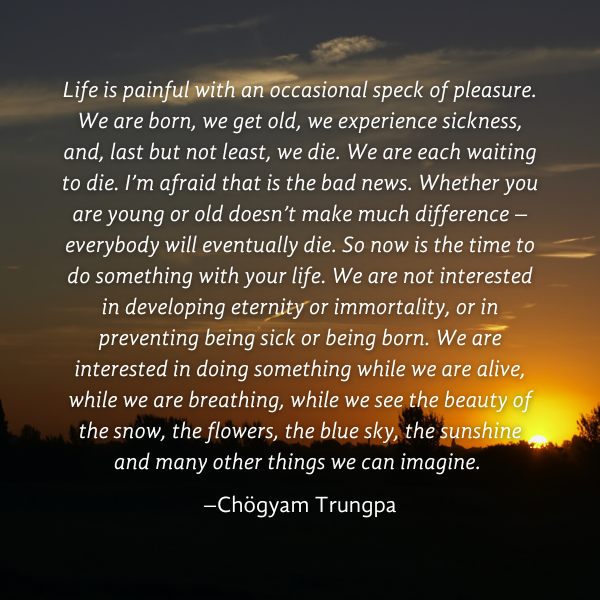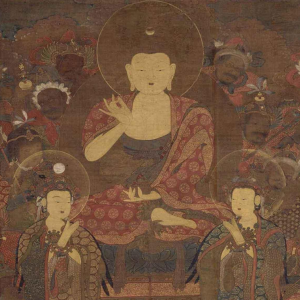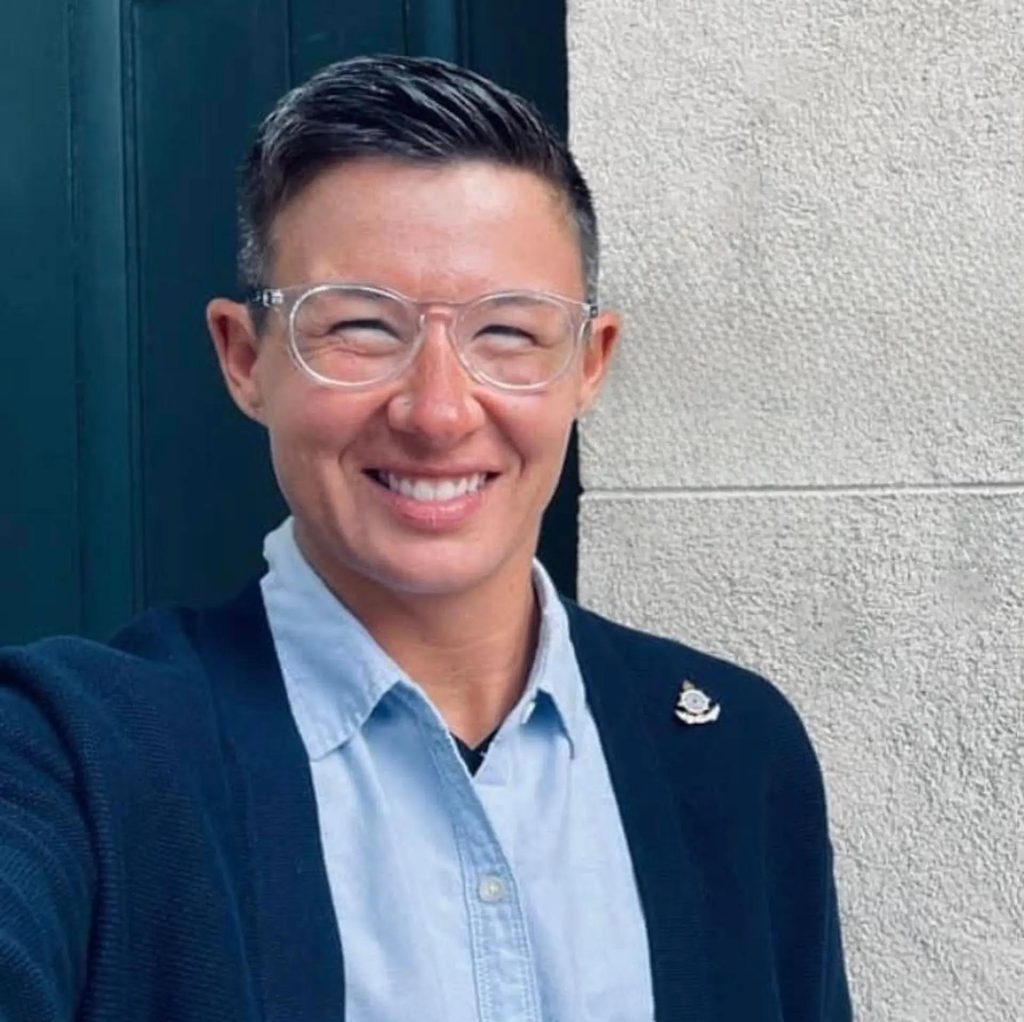Thursday
Dying & Death Classes on Shambhala Online
By Alley Smith

Death is the greatest of all teachers. –The Buddha
Shambhala Online has been offering a variety of courses on topics related to dying and death. These topics enable the sangha and outside community members to gather and think about death, engage in contemplative practices, and toil with topics such as fear, anxiety, the unknown, and how to have conversations about death.
The Shambhala community is gathering with purpose: to understand the dying process, to recognize and articulate the role of spiritual, religious and existential support, practices, and cultural norms within the modern Buddhist context. The result is tremendous openness and courage to face the inevitable and unknown in a gentle and relaxed way.
As Chögyam Trungpa Rinpoche says, Life is painful with an occasional speck of pleasure. We are born, we get old, we experience sickness, and, last but not least, we die. We are each waiting to die. I’m afraid that is the bad news. Whether you are young or old doesn’t make much difference – everybody will eventually die. So now is the time to do something with your life. We are not interested in developing eternity or immortality, or in preventing being sick or being born. We are interested in doing something while we are alive, while we are breathing, while we see the beauty of the snow, the flowers, the blue sky, the sunshine and many other things we can imagine.
While we are alive we can explore our personal belief systems about dying and death, our struggles, vulnerabilities, strong emotions, personal values, needs, and much more. Death has so much to teach us. Even as the Buddha was dying, he taught that suffering (dukkha) comes from not living in accordance with the truth of impermanence and interdependence. Death itself is a profound spiritual transmission.
Students have been gathering across the global community at Shambhala centers in Seattle, Dallas, Halifax, Los Angeles, and Philadelphia to offer support and practice advice. Communities are interested and invested in doing something while they are alive, while breathing, to be embraced by the sangha, to be met with unconditional kindness and the warmth of the Great Eastern Sun.
In the end, everything is left up to the individual. Therefore, most Buddhists do not take the truth of impermanence half-heartedly. Whether we are studying the Tibetan Book of the Dead, teachings of Amitabha Buddha, the Pure Lands, Sukhavati, Bodhichitta, the Bardos, and a vast array of teachings, we must do as many great Rinpoches and Tibetan lamas suggest. Engage in whichever practices are clearest, familiar, and most vivid on our deathbeds.
While we are alive we must be willing to face old age, sickness, and death with confidence and fearlessness. We must abandon any notion of resentment and attachment. Ask yourself, why would the Buddha say, Death is the greatest of all teachers? What can we learn from his words? In the end, as Trungpa Rinpoche says, “It’s up to you sweetheart.”
Shambhala Online would like to invite you to attend any one of these upcoming sessions in 2025:
Fear & Fearlessness: Navigating Life & Loss
March 27. During this online session, we will explore Chögyam Trungpa Rinpoche’s teachings on “Fear and Fearlessness” from the timeless classic, Shambhala: The Sacred Path of the Warrior.
The Buddha’s Discourse on Teachings to Be Given to the Sick
November 1. During this mini-retreat, we will read and explore the Buddha’s Discourse on the Teachings to Be Given to the Sick. We will examine traditional Buddhist teachings on the six senses, six sense objects, six elements, the five aggregates, and more.
Making Friends with Death & Dying: Support Group (1st Monday night of every month)
Next session April 7. Support group sessions will include a short talk, meditation practice, and an open forum to discuss personal experiences with old age, sickness, death, grief and bereavement. All are welcome. We respect your privacy. These sessions will not be recorded.
The 49 Day Ceremony: A Celebration of Life & Death
December 13. Join Chaplain Alley Smith for a 3-hour online mini-retreat as she guides participants into a deeper understanding of the 49 Day Ceremony and the common Buddhist practices and rituals that follow someone’s death – all within a modern Buddhist context.
Alley Smith (she/her) is an ordained Zen Buddhist Chaplain, scholar, researcher, and lecturer who serves at a college and university. Alley is deeply influenced by Pure Land Buddhism and Vajrayana. She has been a member of Shambhala and Zen since 1999. Alley works in the funeral industry in Vermont. She teaches a number of courses on Shambhala Online.
Entries filed under Dharma Teachings
Acknowledging Death – HIGHLIGHT
By Chogyam Trungpa In discussing sickness, whether physical or mental, we should recognize the importance of our sense of survival. We want to survive, and when we talk about healing, we are talking about how to survive. Viewed from another angle, our strategy of survival is the ... continuePosted May 29, 2009 by
How to Work with Obstacles – HIGHLIGHT
By Sakyong Mipham Rinpoche Whatever our level of practice, there will always be obstacles. The Tibetan word for obstacle, parche, means “what cuts our progress.” In fact, sometimes the more we are engaged in practice, the greater the obstacles become. If we understand that obstacles are ... continuePosted May 11, 2009 by Jennifer Holder
Equanimity in Uncertain Times – HIGHLIGHT
By Sakyong Mipham Rinpoche There are many layers to the process of enlightened society and how it manifests—and how we manifest it ourselves and in our own lives. Now we are at the point where we are looking at how we can manifest it at an earthly ... continuePosted May 8, 2009 by
Dedicating Energy – HIGHLIGHT
As Shambhalians, when we conclude our meditation practices or close teaching events, we dedicate any merit generated to the benefit and enlightenment of all sentient beings. What if, through conscious lifestyle changes, we dedicated the surplus of our fortunate situation to the benefit of all ... continuePosted April 18, 2009 by
Warrior Song of King Gesar
Our earth is wounded Her oceans and lakes are sick Her rivers are like running sores The air is filled with subtle poisons And the oily smoke of countless hellish fires blackens the sun Day has become night. Fish are born deformed; birds fall lifeless from the sky Forests and plains wither Animals running ... continuePosted April 17, 2009 by Jennifer Holder
The Joy Continues – HIGHLIGHT
Excerpted from the book Warrior-King of Shambhala: Remembering Chogyam Trungpa by Jeremy Hayward A Middle Way If there is a middle way, even in regard to death, what might it be? To try to understand this, let us look at some ideas that Rinpoche himself conveyed to us ... continuePosted April 10, 2009 by Jennifer Holder
Generosity Is the Foundation of Enlightened Society, by Lady Diana Mukpo – HIGHLIGHT
From a talk given at Sky Lake Lodge, April 3-5, 2009 during the program, “Creating Enlightened Society and the Parinirvana of Chogyam Trungpa Rinpoche” Together, we are marking the 22nd anniversary of the passing of the Vidyadhara. A friend of mine recently called me and said, “Well… ... continuePosted April 9, 2009 by Jennifer Holder
Karma and the Economy, by Acharya Eric Spiegel – HIGHLIGHT
How are we to understand what is going on right now in the world? How can so many people be suffering and there be no direct culprit? As I have been contemplating this crisis and watching (and living) the enormous suffering that is it’s ... continuePosted April 7, 2009 by Eric Spiegel
Basic Anxiety Is Happening All the Time, by Chogyam Trungpa – HIGHLIGHT
This is an excerpt from the first book in the Root Text Project, The Truth of Suffering and the Path of Liberation. If you purchase a copy from the Shambhala Shop, all proceeds will go to the project. We are born as human beings, as we ... continuePosted April 3, 2009 by Jennifer Holder
Shambhala Lineage, by Chogyam Trungpa
Making the journey of warriorship depends first of all on your personal realization of genuineness and basic goodness. Ultimately, giving up selfishness, or ego, is only possible if you have a living, human example—someone who has already done so, and therefore makes it possible for ... continuePosted April 3, 2009 by Jennifer Holder
Longevity Supplication for Sakyong Mipham Rinpoche
Because the experience of chanting is very personal and the images are intended to be provocative, we offer this essay with the intention of starting a conversation. Please do contribute your reflections in the comments section. As with other longevity chants, this one is all about ... continuePosted April 3, 2009 by
The Birthday Sadhana
On my birthday a few weeks ago I had the annual profound experience of waking up in the morning and doing the simple practice known generally as “The Birthday Sadhana”. This is the same basic practice we do as a group on Shambhala Day as “Elixir of Life”. ... continuePosted March 12, 2009 by Eric Spiegel
Essays on the Shambhala Buddhist Chants
[caption id=”attachment_504″ align=”alignright” width=”150″ This document has drawn immensely appreciative feedback. The following excerpt from the Preface might help explain why: The Kootenay Shambhala Centre is in the town of Nelson, B.C., Canada. We have had the usual disagreements about whether it is appropriate to do ... continuePosted February 27, 2009 by James Northcote
The Wish-Fulfilling Jewel, by Sakyong Mipham – HIGHLIGHT
The Buddha said, “Within your own mind, you already have what you need to succeed—the ability to put others ahead of yourself. This is called virtue, the wish-fulfilling jewel.” Whatever our situation, we can use virtue to make our life meaningful, strong, and happy. In the Tibetan ... continuePosted February 21, 2009 by Jennifer Holder
Teachings for Times of Great Challenge, a letter from the editor
Dear Shambhala Times Readers, We are facing a deep economic winter in which we are challenged to hold our seats and continue to turn outwards to help others. To inspire our practice as warriors in this world, the Shambhala Times offers these dharma teachings, filled with ... continuePosted February 20, 2009 by Jennifer Holder
![]() RSS feed for the Dharma Teachings category
RSS feed for the Dharma Teachings category
View all posts from authors in Dharma Teachings: jillian_johnson




















